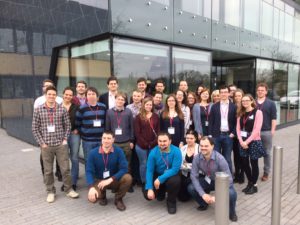Happy Easter and welcome to the new NERC Arctic Office website! We’ve been working hard over the last few months to deliver the new site, so it’s a real pleasure to launch the first phase today.
The brief we gave ourselves – and that the community has echoed – is for a site that is visually stronger and clearer; where it is easier to find important and timely information; and which acts as a stronger and more meaningful source of detailed information on UK-based researchers and their research in the Arctic. Whilst the third part of that brief, the ‘projects database’, is not quite ready yet – a few more weeks of testing is needed – we think the new website already makes a big improvement in how we engage with the Arctic research community. We hope you like it. As always, your feedback is very welcome.
We will be using the News and Blog features of the website, in combination with Twitter posts, to provide much more regular updates on how the Arctic Office is supporting the UK Arctic research community, details of upcoming opportunities and international events. This Blog will be open to researchers and we’re keen to use it to showcase the huge range and depth of work that the community is engaged in. We will continue with the e-mailed Bulletins as well, with the series restarting in the week of 16 April. To comply with new data protection rules if you want to receive the Bulletin you will need to re-register for it by subscribing for updates. Registration details will also be in the next Bulletin.
Looking back over the last few months there has been a lot of activity, in addition to the website development, that we have been engaged in with researchers and that we want to update you on. We will do this properly through these Blogs and also through the Bulletin. It includes: the development of the 2nd year of the UK-Canada Arctic Bursaries, with 12 UK-based recipients heading to the Canadian Arctic this season; agreement from NERC to fund the UK’s Arctic Station in Ny-Alesund, Svalbard for ten years, securing the facility for the use of researchers and reinforcing the commitment for the station to support new and innovative research; and a series of events for early career researchers in the UK and Russia focused on research cooperation in the Russian Arctic. Working in partnership with the UK Polar Network and APECS Russia and the UK’s Science and Innovation Network we brought together 30 early career researchers in separate events in Moscow and Cambridge to exchange ideas and experiences, develop new cooperation and commit to a range of practical action to increase research opportunities and engagement. Despite the impact of wider events there was a unanimous understanding that such cooperation for both research and science diplomacy purposes is even more important than before. Having invested heavily in building these connections we will be nurturing them in the months and years ahead.

Looking forwards, 2018 promises to continue to be a busy and important year. The Arctic Office will be at the POLAR2018 events in Davos in June, taking part in the official meetings, the open science conferences and the Arctic Observing Summit. We are also financially supporting the UK’s International Arctic Science Committee representatives to attend. Parliament’s Environmental Audit Committee has restarted its ‘Arctic Sustainability’ inquiry and has called for written evidence by mid-May, with evidence in person to follow. We also hope to be able to support a visit from the Committee to the Arctic as part of their ongoing work. We are working with Government colleagues in their preparations for the Arctic Science Ministerial in October in Berlin. The last meeting, in Washington DC in 2016 was pivotal in securing support for the UK’s engagement in MOSAiC and for the UK-Canada Bursaries Programme. Talking of MOSAiC, we look forward to the successful UK projects funded by NERC being announced in the coming period. We will also be working closely with the FCO and others to ensure that the implementation of the Agreement on Enhancing International Arctic Scientific Cooperation extends its benefits to UK researchers wherever possible.
So lots to come, but in the meantime please enjoy the new website. All your feedback and suggestions (please send to arctic@bas.ac.uk) for future Blog topics and authors will be well-received.
Henry Burgess
NERC Arctic Office